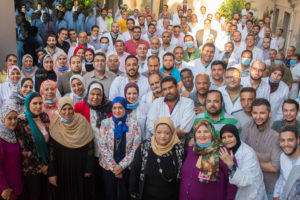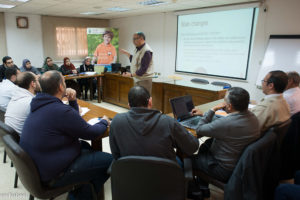Persistent Organic Pollutants (POPs)
Dioxins and furans are a group of chemically-related compounds that are highly toxic and persistent.Presence of even low concentrations of Dioxins in food and environment leads to various health risks. Dioxins are measured by picogram (pg.), determination of dioxin requires a highly precise and specific instruments for that type of pollutants like HRGC-HRMSD, GC-MS/MS and HRAM LC-MS/MS (Orbitrap).
QCAP is the 1st accredited lab in Egypt and Middle East that has the ability to analyze POPs (Dioxins, Furans and dl-PCBs) according to ISO/IEC 17025.
The United Nation Environment Program (UNEP)has recognized QCAP as the reference lab for Persistent Organic Pollutants (POPs) in Egypt.
POPs analysis includes:
- Polychlorinated Dibenzo-P-Dioxins (PCDDs).
- Polychlorinated Dibenzofurans (PCDFs) .
- Dioxin-like Polychlorinated Biphenyls (dl-PCBs).
- Non-Dioxin like Polychlorinated Biphenyls (Non-dl-PCBs)
- Pentachlorophenol (PCP).
- Poly Aromatic Hydrocarbons (PAHs) .
- Bisphenols (A,S and F).
- Phthalates Compounds.
- Residual solvents in food.
- Alcohols in food (Halal Foods).
Sample types for POPs analysis:
- Food of animal origin like: milk, dairy products, meat and poultry, fish and its products, feed of animal origin, eggs and its products.
- Food of plant origin like: Oils,beverages,Juices, Feed and Guar Gum.
- Environmental samples like: stack emission, industrial emission, incinerators emissions, soil, sludge, water and air.
Packaging and Food Contact Materials (FCMs)
Food contact materials (FCMs) include all such materials and articles intended to be in contact with food and drinks, as containers, packaging, kitchen utensils, cutlery, and dishes.
FCMs also encompass materials used in food processing equipment, such as coffee makers or food production machinery, as well as containers used for transporting foodstuffs.
FCMs can be made from a variety of materials such as plastic, rubber, paper, ceramic, and metals.
QCAP is the accredited lab of the Egyptian Accreditation Council (EGAC). Thatprovides analysis of Food contact materials (FCM) through migration test studies including overall migrationin several wayssuch as (total immersion, pouch,cell,article filling and fatty food) and/orspecific migration of many compounds Such as:
- Phthalates .
- Poly Aromatic Hydrocarbons.
- Formaldehyde.
- Pentachlorophenol.
- Bisphenols A, S and F .
- Residual solvents.
They’re regulatory requirements to determine the safety of foodstuff or packaging materials or articles, and support toxic risk assessment.
Types of samples that can be analyzed as food contact materials (FCM)
- Plastic Food Contact Materials and Articles .
- Ceramic Food Contact Materials and Articles.
- Metal and Alloys Food Contact Materials and Articles.
- Paper and Paperboard Food Contact Materials and Articles.
- Glass Food Contact Materials and Articles .
- Rubber Food Contact Materials and Articles.
- Active Food Contact Materials and Articles.
- Intelligent Food Contact Materials and Articles.
Finally, Restriction of Hazardous Substances in Electrical and Electronic Equipment (RoHS) according to EU rules.
Staff
Prof. Dr. Yasser Nabil – Head
Dr. Ashraf Samy – Deputy




